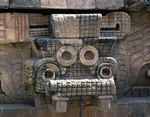There are numerous significant events that stand out from the era of discovery of the Americas. One event in particular is Hernando Cortés and his group of six hundred men conquering the Aztec Empire. One might ask how this conquest was possible? How was a small number of men able to conquer an entire empire? One factor that contributed to the Spanish conquest was the disease smallpox; however, there was another variable as well. The Aztec emperor Montezuma mistakenly believed Cortés to be Quetzalcoatl, an all powerful Aztec god who had promised one day to return to his people.1 So who was this supposed almighty god and why was Cortés believed to be him?

Quetzalcoatl, though most famously known for his relation to the Aztec religion, was actually acknowledged long before the Aztec civilization. Quetzalcoatl’s believers stretched all over Mesoamerica after the fall of Teotihuacan.2 Teotihuacan was a prehistoric city located in Central Mexico. The city arose around the first or second century BCE and fell around the 600s or 700s.3 The information regarding the civilization residing inside of Teotihuacan is still not fully known due to outside elements such as weather and other tribes who may have resided or passed through the area. The exact reason for the destruction of the city is still unknown. Although, archaeologists speculate the downfall was caused by a rapid decline in population.4 In accordance with Aztec legend, Quetzalcoatl had traveled from the east and elevated the Aztec empire by teaching them how to grow crops, develop architectural structures, and create tools with medal. He also helped construct the Aztec calendar. When an unknown rival tribe had surfaced, they drove Quetzalcoatl away. Before he left, Quetzalcoatl promised one day to return and save his oppressed people.5 Quetzalcoatl’s deity is represented as a feathered serpent.6 He was understood to be the god of learning and the patron of priests.7 Quetzalcoatl’s forthcoming was suspected to be around the same time as Cortés’ arrival.8

Scholars have attained an impressive amount of knowledge from ancient Aztec documents. According to their discoveries, the Aztecs proclaimed various omens of warning, which occurred just before the arrival of the conquistadors. Such omens included: an unusual amount of stars and comets in the sky, a sacred temple caught on fire, and the water on the lakes and rivers seeming to boil. All of these signs and the belief in the soon return of their god Quetzalcoatl, made it easy for the Aztecs to presume that Cortés was their long awaited god. Upon Cortés’ arrival, he was greeted with jewels and an assortment of gifts. When Cortés soon realized who the Aztecs deemed him to be and the influence his mistaken identity could produce, he was quick to use this opportunity to gain Montezuma’s trust, knowledge, resources, material objects, and even his fear. With their own emperor in a state of dismay, the rest of the Aztec people arose in a state of hysteria. This made it possible for Cortés and his men to manipulate the Aztecs, and profit from them what they wanted while they could. Eventually, Montezuma’s mistake led to the conquest of his entire empire.9
The Aztecs’ religious beliefs were fundamental attributes to their civilization. It was a unique quality which made them their own empire. In this particular circumstance, it was also a cause for their destruction. The Aztecs wholeheartedly believed their god Quetzalcoatl was partly responsible for the development of their civilization. Many Aztecs also truly believed Cortés was the return of their beloved god. Unfortunately for the Aztecs, their faith contributed to their conquest.
- Sara E. Cohen, “How the Aztecs Praised Montezuma,” Society for History Education 5, no. 3 (March 1972): 24-26. ↵
- Michael E. Smith, “Aztecs,” in The Oxford Handbook of the Archaeology of Ritual and Religion., by Rowan, Yorke M., ed. Timothy Insoll, vol. 77 (Arizona State Unversity, 2011), 563. ↵
- George L. Cowgill, “State and Society at Teotihuacan, Mexico,” Annual Review of Anthropology 26, no. 1 (October 1997): 129-130. ↵
- George L. Cowgill, “State and Society at Teotihuacan, Mexico,” 156. ↵
- Sara E. Cohen, “How the Aztecs Praised Montezuma,” 24-26. ↵
- Michael E. Smith, “Aztec Culture: An Overview” (Arizona State University, 2006), http://www.public.asu.edu/~mesmith9/1-CompleteSet/Smith-AztecCulture-WWW.pdf, 5. ↵
- Michael E. Smith, “Aztecs,” 563. ↵
- Sara E. Cohen, “How the Aztecs Praised Montezuma,” 24-26. ↵
- Sara E. Cohen, “How the Aztecs Praised Montezuma,” 24-26. ↵



65 comments
Mariana Sandoval
As part of my Intro to Latin America course, I learned about this topic. And it’s interesting to read about the omens that were predicted before the arrival of the conquistadors. They knew something was coming. It’s unfortunate that they believed that Cortes was Quetzalcoatl which led to a long history of conquest and colonial legacy.
Andres Palacios
The thing that caught my attention the most was the effect of the diseases in the community. It’s incredible how these diseases spread out through the world they not only affected different countries and civilizations in the Americas but they also had a huge negative effect in Europe.
Nathan Cantu
What a great article. This truly does put a new prospective on how Cortes conquered the Aztec empire. Also great job on referencing Quetzalcoatl, and how important this God was to the Aztecs. Great job.
Esperanza Mauricio
This reminds me of the road to el Dorado since the two main characters do hitch a ride on Cortes’s boat and are thought to be Gods. Being mistaken for a God can really help the conquering of a people such as the Aztecs.
Maalik Stansbury
Great job. This article is well written and my favorite part is when you wrote about the Gods in relation to the Aztecs and how the people felt towards them.
Maalik Stansbury
Great good. This article is well written and my favorite part is when you wrote about the Gods in relation to the Aztecs and how the people felt towards them.
Yesenia Cardenas
This is a very informative and well written article! You did a great job keeping the readers attention while giving facts about Cortez. It was interesting to read how Cortez was believed to be the their long awaited god.
Jezel Luna
This article was very informing and surprised me in many ways. What really caught my attention was that fact that omens were believed to be a warning to Aztecs. It was crazy how one can mistake Cortes, the one who wanted to conquer the Aztec Empire, for their almighty god. It was very unfortunate that their faith caused the fall of the Mayan Empire. You did a great job explaining this topic, keep up the great work!
Mehmet Samuk
Waow, an empire went down just because omens and some kind of belief system. You made a new perspective for the conquest of Cortez. It was a well-written article. And I am not surprised how Cortez used as an advantage of the Aztec’s religion.
Rachel White
This was a very interesting topic and it made me ponder if a being came to Earth and enough people believed they were a god, how far would we allow them to push us? Would we repeat history and become conquered as well? It was very upsetting that Cortez knew what they believed and therefore used that to bring them to their demise; although, what else can you expect from a conquistador?